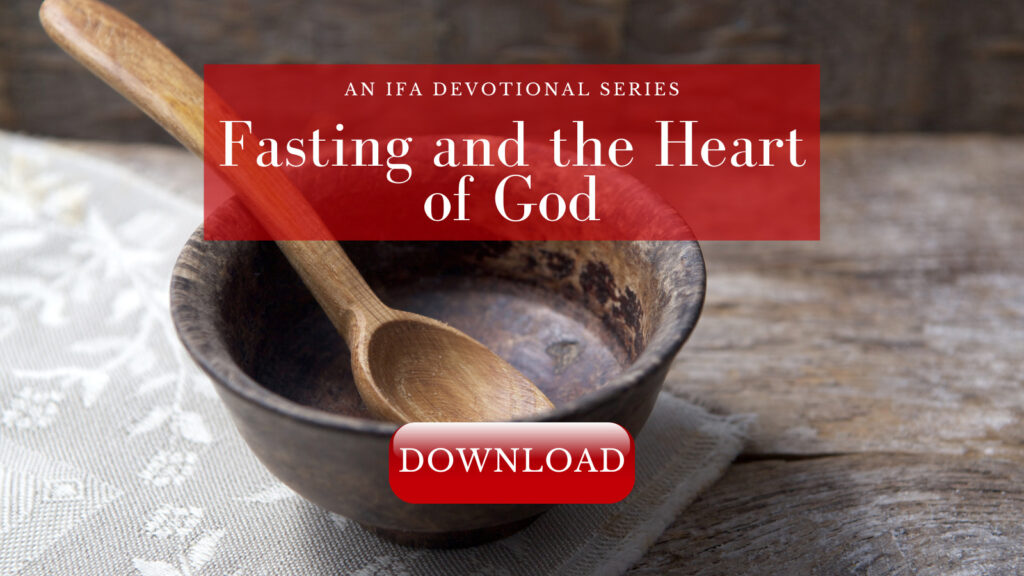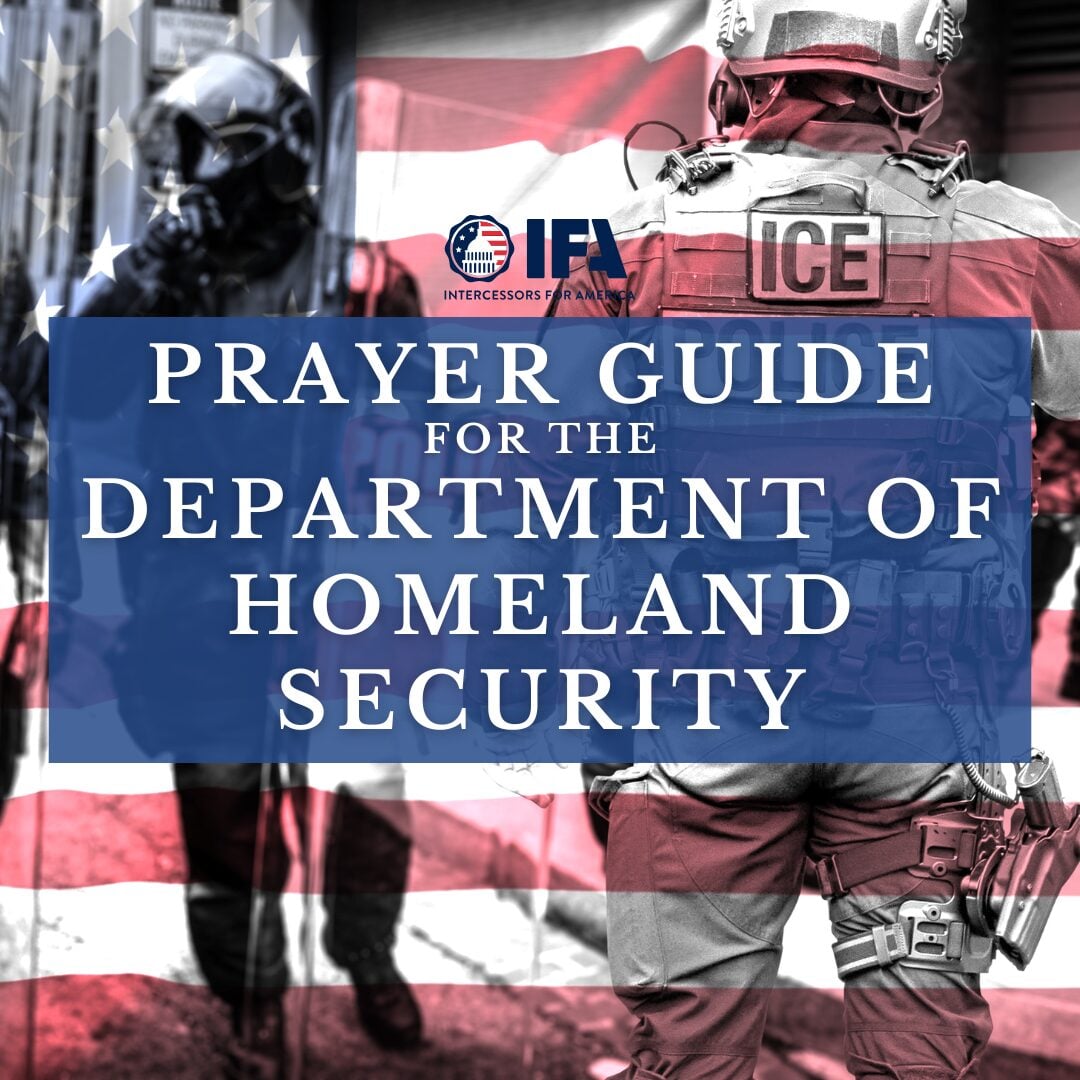Fasting: Prayer’s Power Partner
Congress Sees ‘Sound of Freedom,’ Brings Focus to Issue
Tunnel Vision: Does Prayer Matter?
Even If … A Message of Hope
The Secret to Persevering Prayer
Fasting: Prayer’s Power Partner
This item was originally published March 1, 1977. We thought it would be helpful to a new generation of intercessors.
Forty-five percent of those who answered a recent IFA survey fast regularly. This remarkable interest in fasting demonstrates the serious attitude Christians are taking towards intercessory prayer. The typical fast is either two or three meals, and half of those who are fasting do so each week. Most of the balance fast monthly — predominantly the first Friday of each month. Patterns of fasting vary — but in total, we now know for a fact that fasting is a subject of keen interest among Christians.
Get involved in state level prayer with IFA.
Why this interest? What is fasting, and what is being accomplished by this fact of self-denial which we have historically associated with monastic life in the dark ages?
In attempting to answer these questions, we have drawn from two excellent sources — God’s Chosen Fast, by Arthur Wallis, and How to Fast Successfully, by Derek Prince. Both books are highly recommended for further study. (IFA offers two books on fasting: Fasting, by David Kubal, and Shaping History Through Prayer & Fasting, by Derek Prince.)
We strongly encourage the practice of fasting, for just as faith needs prayer for its full development and growth, prayer needs fasting for the same reason. Hopefully, this brief article will provide such encouragement.
The standard fast excludes food, solid or liquid, but not water. It may last as long as God directs. However, if you have never fasted before, it is best to start by omitting one meal a day and slowly working up to a more extended fast. We read in Luke 2:4 that “He ate nothing during those days.” Later it says, “He became hungry” and the devil tempted Him to eat. Had Jesus fasted without water, the more intense desire at that point would have been to quench His thirst. All of this implies that He fasted without food, but not without water.
In the absolute fast, one abstains from both eating and drinking. This type of fasting is not recommended for more than three days, unless supernaturally inspired by God. Adverse physical effects may occur if the body is without water for a longer period of time. Queen Esther directed Mordecai, “fast for me; do not eat or drink for three days, night or day. I and my maidens will fast in the same way” (Est. 4:16). Absolute fast is usually reserved for spiritual emergencies — after prayer and normal fasting have not secured the victory.
The third type of fasting, the partial fast, emphasizes restriction of diet rather than total abstention. Only selected foods are omitted here. An example of this fast is found in Dan. 10:3. “I did not eat any tasty food, nor did meat or wine enter my mouth…until the entire three weeks were completed.” A partial fast is convenient when circumstances or health do not permit the normal fast. Also, it can be used as a steppingstone to the normal fast by those who have never fasted before.
Fasting is not harmful to the body if conducted properly. In fact, it is very good for the body. The stomach and digestive system are given an opportunity to rest. Blood which is usually involved in digestion is free to purify other areas of the body.
Discomfort is not uncommon during a fast. God never intended it to be pleasant. It is a time of denying ourselves the desires of the flesh to become more in tune with God’s Spirit. We are showing our Heavenly Father that we are willing to sacrifice physically in order to communicate more clearly with Him, to attain what we seek for His Kingdom.
God expects His people to fast. Jesus, instructing His disciples on fasting, said “…when you fast…” (Matt 6:17) He did not say ‘if’ you fast. Fasting is the rule in God’s mind, not the exception.
Fasting helps to rid our hearts of pride and humble us before the Lord. The Psalmist said, “When I humble my soul with fasting, it became my reproach.” (Psalm 69:10) When we approach the Lord in prayer, we must do it with all humility and supplication. Fasting brings us to a state of humbleness that is acceptable to God.
Our Father in Heaven listens more intently to our prayers when we fast, Ezra tells us, “So we fasted and sought our God concerning this matter, and He listened to our entreaty.” (Ezra 8:23) If we truly want God to hear our prayers, we can demonstrate our sincerity by fasting.
Fasting, coupled with prayer, can change the mind of God, even after He was pronounced judgment. When the prophet Jonah proclaimed the destruction of Nineveh, the entire city repented and fasted. “When God saw their deeds, that they turned from their wicked way, then God relented concerning the calamity which He had declared He would bring upon them. And He did not do it.” (Jonah 3:10)
Scripture shows us that God will overthrow the enemies of His people if we seek Him through fasting. “And Jehoshaphat was afraid and turned his attention to seek the Lord; and proclaimed a fast throughout all Judah… And when they began singing and praising, the Lord set ambushes against the sons of Ammon, Moab, and Mount Seir, who had some against Judah; so, they were routed.” (II Chron. 20:3, 22)
Fasting puts down our flesh and increases our spiritual strength and awareness. This makes us more effective in spiritual warfare. “Our struggle is not against flesh and blood, but against the rulers, against the powers, against the world forces of this darkness, against the spiritual forces of wickedness in heavenly places.” (Eph. 6:12) Daniel knew this. He fasted, prayed, and sought the Lord for three weeks. During that same time span, a messenger of God enroute to Daniel was struggling against the spiritual forces of the kingdom of Persia. Finally, as a result of Daniel’s persistent fasting and praying, the messenger was able to break through and reach Daniel. (Dan 10:2-5, 11-13)
Satan has strongholds today similar to those of the kingdom of Persia. We need to pray and fast as Daniel did to bring down these strongholds and reclaim the territory for God. Fasting enables us to be more sensitive to spiritual activity and to be a greater asset to God as He works His will through us.
Intercessors for America is calling Christians to set aside the First Friday of each month to repent, pray, and fast for America and the Church. We believe the concerted, dedicated prayers of God’s people, combined with the self-abasement of fasting, will help us recapture ground lost to Satan and bring God’s mercy on our nation.
Share your prayers and fasting strategies in the comments. And join the First Friday Prayer and Fasting Webcast/Call, August 4, 2023, at 12:15 p.m. ET: IFApray.org/watch or call 667-771-7909.
(Photo Credit: Christopher Jolly on Unsplash)
Partner with Us
Intercessors for America is the trusted resource for millions of people across the United States committed to praying for our nation. If you have benefited from IFA's resources and community, please consider joining us as a monthly support partner. As a 501(c)3 organization, it's through your support that all this possible.


We use cookies to ensure that we give you the best experience on our website. If you continue to use this site we will assume that you are happy with it. Privacy Policy





Comments
No comments have been posted yet; you can be the first!